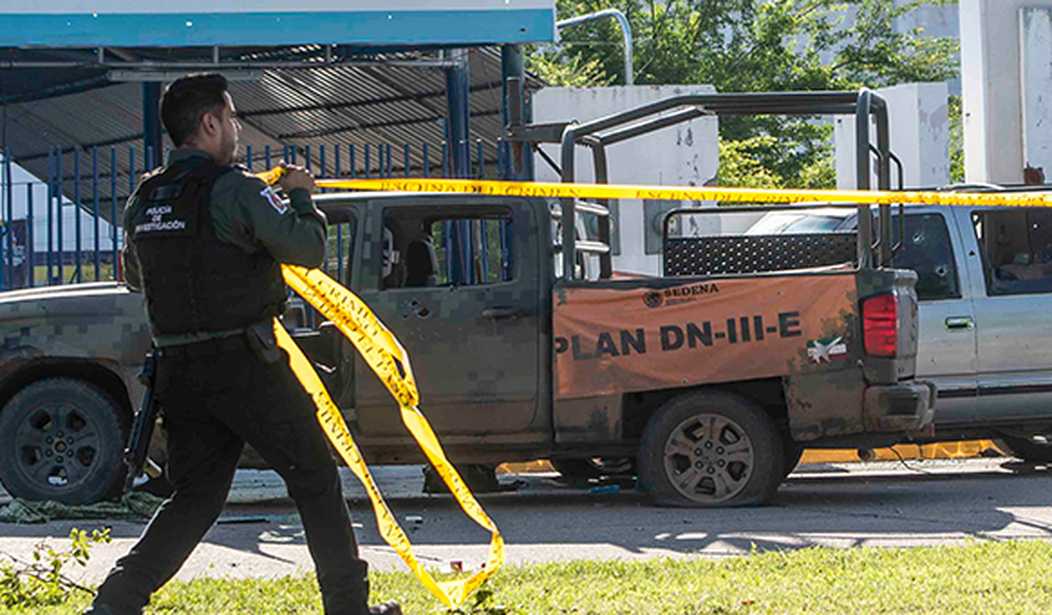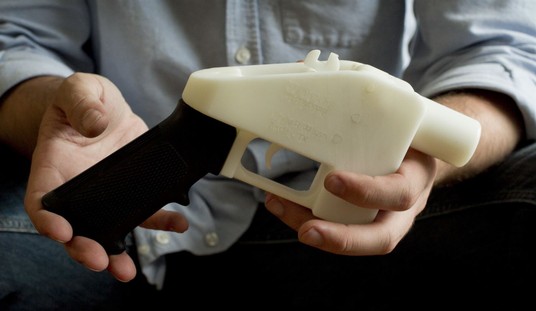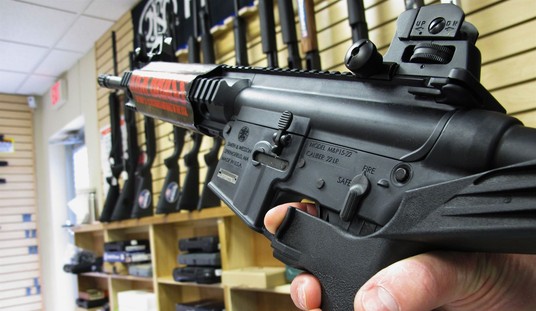Now that the Supreme Court has agreed to decide whether Mexico's $10 billion lawsuit against U.S. gunmakers can proceed or should be thrown out under the Protection of Lawful Commerce in Arms Act, get ready for a wave of op-eds and columns pinning the blame for the cartel violence south of the border on our own Second Amendment rights.
In fact, we're already starting to see the gaslighting from some news outlets, including the Los Angeles Times, where columnist L.Z. Granderson says the cartel violence is "our fault".
A data leak from the Mexican military indicated that more than 90% of the firearms found at crime scenes in Mexico between 2018 and 2022 originated in the United States. We’re talking more than 78,000 guns seized in a country where only two stores sell firearms.
It’s clear American weaponry contributes to the migrant crisis in Central America and to the bloodshed at the U.S.-Mexico border, much in the way secondhand smoke affects the lungs of nonsmokers.
So for Mexico, this lawsuit isn’t a question of guilt but of accountability.
The gun-tracing data in the leak is so comprehensive that Mexican officials know Kentucky, a state roughly 1,300 miles away, produces one of the cartels’ favorite weapons: the Anderson Manufacturing AM-15.
Mexico is also able to identify Americans who have a bad habit of buying guns that end up in the hands of the cartel.
For example, of the 95 semiautomatic rifles purchased in a two-month span by one man in Texas, 66 ended up being seized in Mexico. That gun trafficker spent six months in prison for lying on his firearms forms. The families of those guns’ victims are left to spend the rest of their lives in anguish.
Mexico’s lawsuit seeks billions in damages, alleging that manufacturers knowingly supply the weapons in this ecosystem.
As it turns out, the leaked data from the Mexican government showed that some of the biggest gun traffickers over the past few years were operating under the tacit approval of the Department of Justice and the ATF. As USA Today reported back in May, when they first covered the hacking of the Mexican military's database:
Of the other six top purchasers, half are linked to the Bureau of Alcohol, Tobacco, Firearms and Explosives scandal known as Fast and Furious.
From 2006-2011 agents in Arizona stood down as straw purchasers illegally bought 2,000 guns at shops, intending to use the information to track trafficking patterns and arrest the kingpins. However, agents didn’t deliver the high-level arrests – and in the process, they lost track of hundreds of guns.
One of those guns was recovered at the Nogales, Arizona, crime scene where U.S. Border Patrol agent Brian Terry was killed in 2010 when his tactical unit attempted to arrest a band of robbery suspects.
Hundreds of Fast and Furious firearms have previously been traced to other shootings in Mexico. The new leak indicates hundreds more are still being found.
“It’s appalling,” said Peter Forcelli, a retired ATF deputy assistant director who recently wrote a book critical of Fast and Furious. “This is a stain we all wear. We had a duty to stop the flow of guns and we’re failing.”
Granderson did mention Operation Fast and Furious in his column, along with an earlier "gunwalking" case initiated by the Phoenix field office of the ATF during the George W. Bush administration known as Operation Wide Receiver. Amazingly, though, the columnist uses the examples of our federal government allowing guns to fall into the hands of cartel members as a reason to hold the firearms industry "accountable". Mexico isn't suing DOJ or any other federal agency, despite those documented failures. It's suing some of the biggest gun makers in the country, accusing them of intentionally aiding and abetting the drug cartels by producing firearms that are legal for sale in the United States (and, I would argue, protected by our Second Amendment).
While Granderson at least acknowledged our government's role in intentionally allowing guns to fall into the hands of the Mexican cartels, he completely ignored the role that Mexico's government has played in fueling cartel violence. We know, for instance, that some of the U.S.-made firearms found in Mexico were originally bought by the military and police before being diverted to cartels. But Mexico has also adopted a "hugs, not bullets" strategy to deal with the cartels, and new president Claudia Sheinbaum seems committed to keeping that philosophy in place in her administration.
Sheinbaum took over last week from her mentor, former President Andres Manuel López Obrador, who largely failed in his own plan to bring down Mexico’s homicide rate. López Obrador refused to confront the cartels, instead relying on the armed forces and appeals to gangs to keep the peace.
“There is a continuity in the militarization of public safety,” Mexican security analyst David Saucedo said. “There will also be a continuation of social programs to try to prevent youths from being recruited by organized crime.”
Sheinbaum's top security official, Omar García Harfuch, said that “we will continue with the strategy begun in the administration of President Andrés Manuel López Obrador, to give priority attention to the poorest families.”
Mike Vigil, a former head of the DEA’s foreign operations, said that the new plan appears to be “more of the same.”
... The shortcomings of that militarized approach is evident in provincial cities and towns, where the National Guard performs set-piece patrols and establishes security cordons like soldiers, but do little on-the-street investigative work like police, arrest relatively few people and build even fewer criminal cases.
Inhabitants of rural areas say National Guard officers often refuse to leave their bases until they get orders from headquarters, even if crimes are being committed outside. And a good part of the National Guard's force is currently assigned to rounding up migrants before they reach the U.S. border, not fighting crime.
Pinning the blame for Mexico's cartel violence on the U.S. firearms industry conveniently allows Mexico to avoid scrutiny and responsibility for its unwillingness to combat the cartels at every step. What does "more of the same" mean in practice? Well, consider what Sheinbaum's predecessor said and did when it came to the cartels.
López Obrador has argued before against “demonizing” the drug cartels, and has encouraged leaders of the Catholic church to try to negotiate peace pacts between warring gangs.
Explaining why he has ordered the army not to attack cartel gunmen, López Obrador said in 2022 “we also take care of the lives of the gang members, they are human beings.”
He has also sometimes appeared not to take the violence issue seriously. In June 2023, he said of one drug gang that had abducted 14 police officers: “I’m going to tell on you to your fathers and grandfathers,” suggesting they should get a good spanking.
Asked about those comments at the time, residents of one town in the western Mexico state of Michoacan who have lived under drug cartel control for years reacted with disgust and disbelief.
“He is making fun of us,” said one restaurant owner, who asked to remain anonymous because he — like almost everyone else in town — has long been forced to pay protection money to the local cartel.
“The president said out loud what we had suspected for a long time, that his administration is not really fighting the drug cartels,” said Saucedo, the security analyst. “He has only decided to administer the conflict, setting up what may have to be a crusade against the cartels in the future that he won’t have to fight.”
López Obrador was even investigated for his own alleged ties to the cartels, who are rumored to have financed one of his presidential campaigns, but the Obama and Biden administrations shut down DEA investigations that might have confirmed the reports.
If Granderson wants accountability for cartel violence, he should look south of the border, not at gunmakers like Smith & Wesson, Ruger, and Glock. The Mexican government has adopted strategies that have empowered and emboldened the cartels, and now they're trying to pin their own failures on the firearms industry. Honestly, the Supreme Court shouldn't have to rely on the Protection of Lawful Commerce in Arms Act to toss Mexico's lawsuit, but if that's what it takes to clear the courts of this junk lawsuit so be it.









